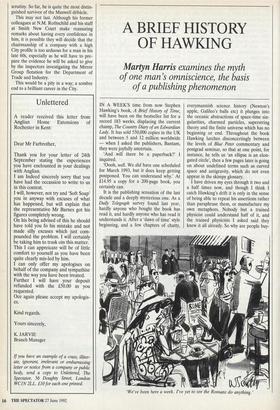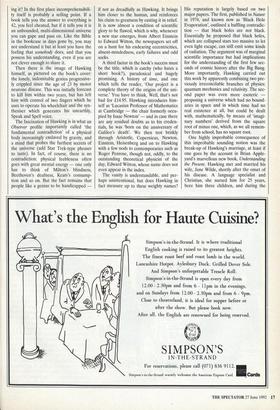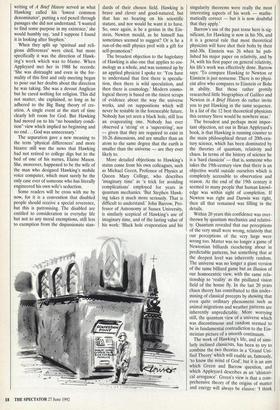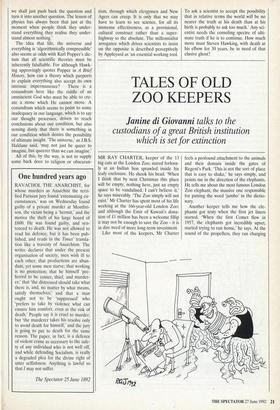A BRIEF HISTORY OF HAWKING
Martyn Harris examines the myth
of one man's omniscience, the basis of a publishing phenomenon
IN A WEEK'S time from now Stephen Hawking's book, A Brief History of Time, will have been on the bestseller list for a record 183 weeks, displacing the current champ, The Country Diary of an Edwardian Lady. It has sold 550,000 copies in the UK and between 5 and 12 million worldwide — when I asked the publishers, Bantam, they were joyfully uncertain.
`And will there be a paperback?' I inquired.
`Oooh, well. We did have one scheduled for March 1993, but it does keep getting postponed. You can understand why.' At £14.95 a copy for a 200-page book, you certainly can.
It is the publishing sensation of the last decade and a deeply mysterious one. As a Daily Telegraph survey found last year, hardly anyone who bought the book has read it, and hardly anyone who has read it understands it. After a 'dawn of time' style beginning, and a few chapters of chatty, everymannish science history (Newton's apple, Galileo's balls etc) it plunges into the oceanic abstractions of space-time sin- gularities, charmed particles, superstring theory and the finite universe which has no beginning or end. Throughout the book Hawking lurches disconcertingly between the levels of Blue Peter commentary and postgrad seminar, so that at one point, for instance, he tells us 'an ellipse is an elon- gated circle', then a few pages later is going on about undefined terms such as curved space and antigravity, which do not even appear in the skimpy glossary.
I have driven my eyes through it two and a half times now, and though I think I catch Hawking's drift it is only in the sense of being able to repeat his assertions rather than paraphrase them, or manufacture my own metaphors. Nobody but a trained physicist could understand half of it, and the trained physicists I asked said they knew it all already. So why are people buy- `We've been here a week. I've yet to see the Romans do anything.' ing it? In the first place incomprehensibili- ty itself is probably a selling point. If a book tells you the answer to everything is 42, you feel cheated, but if it tells you it is an unbounded, multi-dimensional universe you can gape and pass on. Like the Bible in the bookcase in days gone by, you may not understand it but at least you have the feeling that somebody does, and that you possess his understanding, even if you are not clever enough to share it.
Then there is the image of Hawking himself, as pictured on the book's cover: the lonely, indomitable genius progressive- ly crippled since the age of 23 by motor neurone disease. This was initially forecast to kill him within two years, but has left him with control of two fingers which he uses to operate his wheelchair and the syn- thesiser which generates his unearthly, Speak and Spell voice.
The fascination of Hawking is in what an Observer profile importantly called 'the fundamental contradiction' of a physical body increasingly enslaved by gravity, and a mind that probes the furthest secrets of the universe (add Star Trek-type phrases to taste). In fact, of course, there is no contradiction: physical feebleness often goes with great mental energy — one only has to think of Milton's blindness, Beethoven's deafness, Keats's consump- tion and so on. But the fact remains that people like a genius to be handicapped —
if not as dreadfully as Hawking. It brings him closer to the human, and reinforces his claim to greatness by casting it in relief. It is now almost a condition of scientific glory to be flawed, which is why, whenever a new star emerges, from Albert Einstein to Edward Witton, the newspapers set off on a hunt for his endearing eccentricities, absent-mindedness, early failures and odd socks.
A third factor in the book's success must be the title, which is catchy (who hates a short book?), paradoxical and hugely promising. A history of time, and one which tells the reader, 'Our project is a complete theory of the origins of the uni- verse.' You have to think, Well, that's not bad for £14.95. Hawking introduces him- self as `Lucasian Professor of Mathematics at Cambridge — the chair formerly occu- pied by Isaac Newton' — and in case there are any residual doubts as to his creden- tials, he was 'born on the anniversary of Galileo's death'. We then trot briskly through Aristotle, Copernicus, Newton, Einstein, Heisenberg and on to Hawking with a few nods to contemporaries such as Roger Penrose, though not, oddly, to the outstanding theoretical physicist of the day, Edward Witton, whose name does not even appear in the index.
The vanity is understandable, and per- haps unintentional, but does Hawking in fact measure up to these weighty names?
His reputation is largely based on two major papers. The first, published in Nature in 1974, and known now as 'Black Holc Evaporation', outlined a baffling contradic- tion — that black holes are not black. Essentially he proposed that black holes, which are collapsed stars too massive to let even light escape, can still emit some kinds of radiation. The argument was of marginal scientific importance but had implications for the understanding of the first few sec- onds of cosmic history after the Big Bang. More importantly, Hawking carried out this work by apparently combining two pre- viously irreconcilable branches of physics: quantum mechanics and relativity. The sec- ond paper was even more esoteric proposing a universe which had no bound- aries in space and in which time had no real existence at all, but could be dealt with, mathematically, by means of 'imagi- nary numbers' derived from the square root of minus one, which, as we all remem- ber from school, has no square root.
One highly improbable consequence of this improbable sounding notion was the break-up of Hawking's marriage, at least if one goes by the account in Brian Apple- yard's marvellous new book, Understanding the Present. Hawking met and married his wife, Jane Wilde, shortly after the onset of his disease. A language specialist and Christian, she nursed him for 25 years, bore him three children, and during the writing of A Brief History served as what Hawking called his 'lowest common denominator', putting a red pencil through passages she did not understand. 'I wanted to find some purpose in my existence,' she would humbly say, 'and I suppose I found it in looking after Stephen.'
When they split up 'spiritual and reli- gious differences' were cited, but more specifically it was the direction of Hawk- ing's work which was to blame. When Appleyard met her in 1988 he records: `She was distraught and even in the for- mality of this first and only meeting began to pour out her doubts about the direction he was taking. She was a devout Anglican but he cared nothing for religion. This did not matter, she explained, so long as he adhered to the Big Bang theory of cre- ation. A single event at the start of time clearly left room for God. But Hawking had moved on to his "no boundary condi- tion" view which implied no beginning and no end ... God was unnecessary.'
The separation gave a new meaning to the term 'physical differences' and more bizarre still was the news that Hawking had not retired to college digs but to the bed of one of his nurses, Elaine Mason. She, moreover, happened to be the wife of the man who designed Hawking's mobile voice computer, which must surely be the only case ever of someone who has literally engineered his own wife's seduction.
Some readers will be cross with me by now, for it is a convention that disabled people should receive a special reverence, but this is patronising. The disabled are entitled to consideration in everyday life but not to any moral exemptions, still less to exemption from the dispassionate stan-
dards of their chosen field. Hawking is brave and clever and good-natured, but that has no bearing on his scientific stature, and nor would he want it to have. So, once again, is he a genius in the Ein- stein, Newton mould, as he himself has sometimes seemed to suggest? Or is he a run-of-the-mill physics prof with a gift for self-promotion?
The broadest objection to the hagiolatry of Hawking is also one that applies to cos- mology as a whole, and was summed up by an applied physicist I spoke to: 'You have to understand that first there is specula- tion, then there is wild speculation, and then there is cosmology.' Modern cosmo- logical theory is based on the tiniest scraps of evidence about the way the universe works, and on suppositions which will never be testable in the foreseeable future. Nobody has yet seen a black hole, still less an evaporating one. Nobody has ever observed a 'string' or a `superstring', nor — given that they are required to exist in 10-26 dimensions, and are smaller than an atom to the same degree that the earth is smaller than the universe — are they ever likely to.
More detailed objections to Hawking's status come from his own colleagues, such as Michael Green, Professor of Physics at Queen Mary College, who describes `imaginary time' as 'a trick for avoiding complications' employed for years in quantum mechanics. 'But Stephen Hawk- ing takes it much more seriously. That is difficult to understand.' John Barrow, Pro- fessor of Astronomy at Sussex University, is similarly sceptical of Hawking's use of imaginary time, and of the lasting value of his work: 'Black hole evaporation and his singularity theorems were really the most interesting aspects of his work — mathe- matically correct — but it is now doubtful that they apply.'
Barrow's use of the past tense here is sig- nificant, for Hawking is now in his 50s, and it is a general rule that most theoretical physicists will have shot their bolts by their mid-30s. Einstein was 26 when he pub- lished his major paper on relativity, and by 34, with his first paper on general relativity, his life's work was effectively done. Barrow says: 'To compare Hawking to Newton or Einstein is just nonsense. There is no physi- cist alive who compares to Einstein or Bohr in ability. But those rather grottily researched little biographies of Galileo and Newton in A Brief History do rather invite you to put Hawking in the same sequence. In a list of the 12 best theoretical physicists this century Steve would be nowhere near.'
The broadest and perhaps most impor- tant objection, set out in Brian Appleyard's book, is that Hawking is running counter to the main philosophical thrust of 20th-cen- tury science, which has been dominated by the theories of quantum, relativity and chaos. In terms of the history of science he is a 'hard classicist' — that is, someone who takes the 19th-century view that there is an objective world outside ourselves which is completely accessible to observation and reason. At the end of the 19th century it seemed to many people that human knowl- edge was within sight of completion. I f Newton was right and Darwin was right, then all that remained was filling in the details.
Within 20 years this confidence was over- thrown by quantum mechanics and relativi- ty. Quantum revealed that our perceptions of the very small were wrong, relativity that our perceptions of the very large were wrong too. Matter was no longer a game of Newtonian billiards ricocheting about in predictable patterns, but something that at the deepest level was inherently random. The universe was no longer a giant version of the same billiard game but an illusion of our homocentric view, with the same rela- tionship to 'reality' as the pixillated vision field of the house fly. In the last 20 years chaos theory has contributed to this under- mining of classical precepts by showing that even quite ordinary phenomena such as animal migrations and weather patterns are inherently unpredictable. More worrying still, the quantum view of a universe which was discontinuous and random seemed to be in fundamental contradiction to the Ein- steinian picture of a smooth continuum. The work of Hawking's life, and of simi- larly inclined classicists, has been to try to combine the two theories in a 'Grand Uni- fied Theory' which will enable us, famously, `to know the mind of God', but it is an aim which Green and Barrow question, and which Appleyard describes as an `ahistori- cal arrogance' Green's view is that a com- prehensive theory of the origins of matter and energy will always be elusive: 'I think we shall just push back the question and turn it into another question. The lesson of physics has always been that just at the moment when people think they under- stand everything they realise they under- stand almost nothing.'
The idea that life, the universe and everything is 'algorithmically compressible' also seems at odds with Karl Popper's dic- tum that all scientific theories must be inherently falsifiable. For although Hawk- ing approvingly quotes Popper in A Brief History, how can a theory which purports to explain everything also accept its own intrinsic impermanence? There is a conundrum here like the riddle of an omniscient God who must be able to cre- ate a stone which He cannot move. A conundrum which seems to point to some inadequacy in our language, which is to say our thought processes, driven to reach conclusions about our condition, but also sensing dimly that there is something in our condition which denies the possibility of ultimate insight. 'The universe,' as J.B.S. Haldane said, 'may not just be queer to imagine, but queerer than we can imagine.'
All of this, by the way, is not to supply some back door to religion or obscuran- tism, through which clergymen and New Agers can creep. It is only that we may have to learn to see science, for all its immense effectiveness, as a provisional, cultural construct rather than a super- highway to the absolute. The millennialist arrogance which drives scientists to insist on the opposite is described perceptively by Appleyard as 'an essential working tool. To ask a scientist to accept the possibility that in relative terms the world will be no nearer the truth at his death than at his birth is probably to ask too much.' Any sci- entist needs the consoling spectre of ulti- mate truth if he is to continue. How much more must Steven Hawking, with death at his elbow for 30 years, be in need of that elusive ghost?





















































 Previous page
Previous page